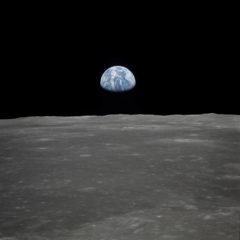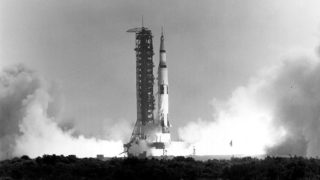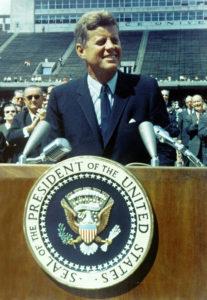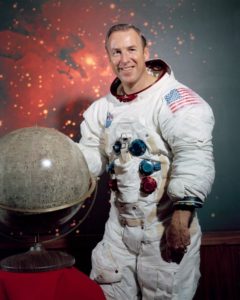
I’ve always been enamored by the Space Program. I remember putting on a football helmet, backpack covered in tin foil, recreating Armstrong’s first steps on the moon for something, though I have no idea what and that was when I was 8 or 9?
I remember watching The Right Stuff and, what is quite possibly the best miniseries on the Mercury, Gemini, and Apollo era of NASA Moonshot which was co-written by Deke Slayton and Al Shepherd.
And of course, last summer I read First Man, Carrying the Fire, and Return to Earth, which is as close to being on the inside of the Apollo 11 flight as you can get since First Man is a biography of Armstrong, and Carrying the Fire is Collin’s autobiography, and Return to Earth is Aldrin’s.
Just recently Norman Mailer’s Of a Fire on the Moon was an eye-opener as well… And yet, I’ve come back to the same idea I had when Neil Armstrong died a few years back… Why haven’t we gone back to the moon, since the Apollo program? And moreover, how did we come to stall out in the exploration of space?
Mars or Bust by 2000
Vice President Agnew was so enthralled in the moonshot that he made news which was relayed up to Apollo 11 that he stated that we should put a Man on Mars by 2000. The news item made almost every paper.
Headline: Agnew Calls For ‘Man on Mars’
WASHINGTON (UPI) – Vice President Spiro T. Agnew has called for putting a man on Mars by the year 2000. But Democratic leaders replied priority must go to needs on earth. Agnew, ranking government official at the Apollo 11 blastoff Wednesday, apparently was speaking for himself and not necessarily the Nixon Administration when he said: “We should, in my judgment put a man on Mars by the end of this century.”
That was 1969. In 1989, President George H. W. Bush talked about “a manned mission to Mars,” in 2004 President George W. Bush talked about “human missions to Mars,” and President Barack Obama can be quoted in 2010 saying “By the mid-2030s, I believe we can send humans to orbit Mars and return them safely to Earth. And a landing on Mars will follow. And I expect to be around to see it.”

There still hasn’t really been a rocket as powerful as the Saturn V, but let’s be honest the early smartphones, much less the ones of today have more computing power than the entire Apollo Command Module. Even if we used the same Saturn V, the computer components would be smaller and more powerful, not to mention lighter for liftoff.
Let us also not forget that there’s a legit space station orbiting Earth once every 92 minutes! Von Braun, the father of modern rocketry original wanted to go to the Moon, not directly, but from a space station. Now we have one and we haven’t done much exploring!
Why the Moon?
Because it’s there! Well, it is, but you have to go back to President Kennedy’s now-famous speech at Rice University because he did cover the why question, you just have to watch the tape (or read the speech) before the famous words we’re all more familiar with: “There is no strife, no prejudice, no national conflict in outer space as yet. Its hazards are hostile to us all. Its conquest deserves the best of all mankind, and its opportunity for peaceful cooperation many never come again. But why, some say, the moon? Why choose this as our goal? And they may well ask why climb the highest mountain? Why, 35 years ago, fly the Atlantic? Why does Rice play Texas?”

Armstrong too said something more to the point of our nature of exploring before the mission, “I think we’re going to the moon because it’s in the nature of the human being to face challenges. It’s by the nature of his deep inner soul… we’re required to do these things just as salmon swim upstream.”
But I think Collins said it best when he stated “It’s been one of the failings of the Space Program . . . that we have been unable to delineate clearly all the reasons why we should go to the moon. I think the key to it is that man loses something if he has the option to go and does not take it.”
Even Aldrin in his 1973 autobiography said “Twelve American men have now visited the surface of the moon. If the twelve of us have any one viewpoint in common, it is that unlike most men we have a special concept of the earth. We have seen it from space as whole and bright and beautiful; we have seen it from the surface of the moon as not very large and somehow vulnerable. With all its imperfections, it is a great place to come from and an even greater place to go back to.”
Think about that… He wrote those words in 1973 and the number of men that have set foot on the moon since then hasn’t changed in the 46 years since. Again I go back to the fact that we haven’t had a “manned” mission leave high-earth orbit since Apollo 17.

Who will that be, indeed?
But before I let you go, I’d be remiss if I didn’t share one of the more ridiculous factoids I came across in all of the reading I have done on Apollo 11: Their travel expense reimbursement.
$33.31
Mentioned by James Hansen in the Armstrong biography and specifically mentioned by both Aldrin and Collins in their autobiographies, their total travel expense reimbursement “From House, Tex., to Cape Kennedy, Fla., to the Moon, to the Pacific Ocean to Hawaii and return to Houston, Tex.”
Perhaps $33.31 is exactly the reason we haven’t gone back to the moon. Bureaucracy doesn’t explore.